We’re all still learning. Even the best teachers who have been teaching piano for decades will tell you that you will never stop learning. And that’s great, because it means we’re always trying to better ourselves, even if we make mistakes along the way.
I want to get personal and share the top six mistakes I made when I first started teaching piano so that:
If you’d like more support and encouragement from a community of like-minded educators, sign up to TopMusicPro.
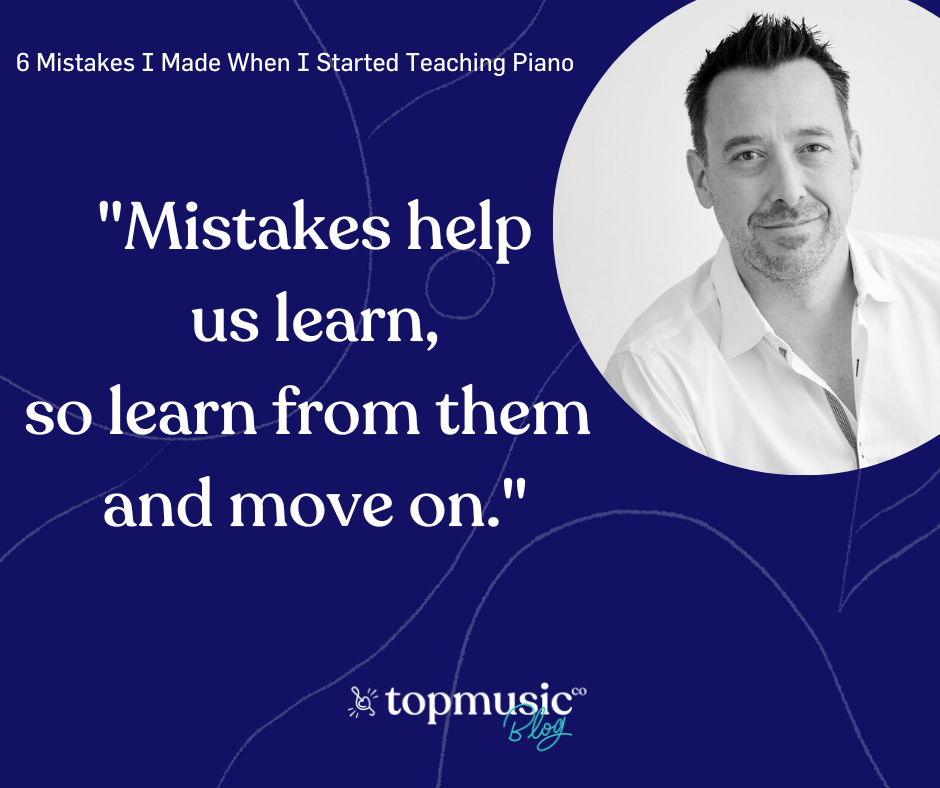
Teaching is a learning curve for both yourself and your students. Whether you’re an absolute beginner giving your first ever piano lesson, or if you’ve been in the profession for years, you will always be faced with new challenges.
And that’s great. Exciting even!
Whenever you are trying to develop or improve yourself in any area, mistakes are a natural part of the journey. Whether that’s trying a new method, or learning a hard piece, you’ll make mistakes.
And that’s totally cool. What matters is how you use those mistakes to grow.
When I started teaching piano, I was always wondering whether I was doing things the way teachers are supposed to, asking myself questions like:
Questioning yourself is the natural reaction when you start something new. When you’re new to something and committed to doing the best job possible, you’re going to doubt yourself. A lot. Even worse if you’re a perfectionist!
Questioning yourself, however, is a mistake. While it’s important to question your practices and always try to develop and refine them, worrying constantly about them can become debilitating and distract you from your core purpose: sharing your love of music with other people.
Keep in mind: there often isn’t a ‘right way’ to teach! The ‘Russian School’ of teaching, for example, is very different to other European schools and what they might be doing in America or Australia. Sure, there are some common pedagogical tactics (keeping fingers in a naturally curved shape, for example), but a lot of other things are open to interpretation.
Finding out the ‘right way’ to teach piano comes down to trial and error (and reading and research.) Many piano teachers are self-taught or have limited training before they teach their first lesson. Other teachers, however, like me, may have been mentored by an older teacher, providing them with an insight into good habits of an effective teacher. Some teachers will even have been pedagogy majors in University, studying the best ways to teach students. But sometimes, no matter how prepared or underprepared you are, finding the best way to teach for you can be a daunting task.
Recommended: 5 things I wish I was told when I started teaching piano…
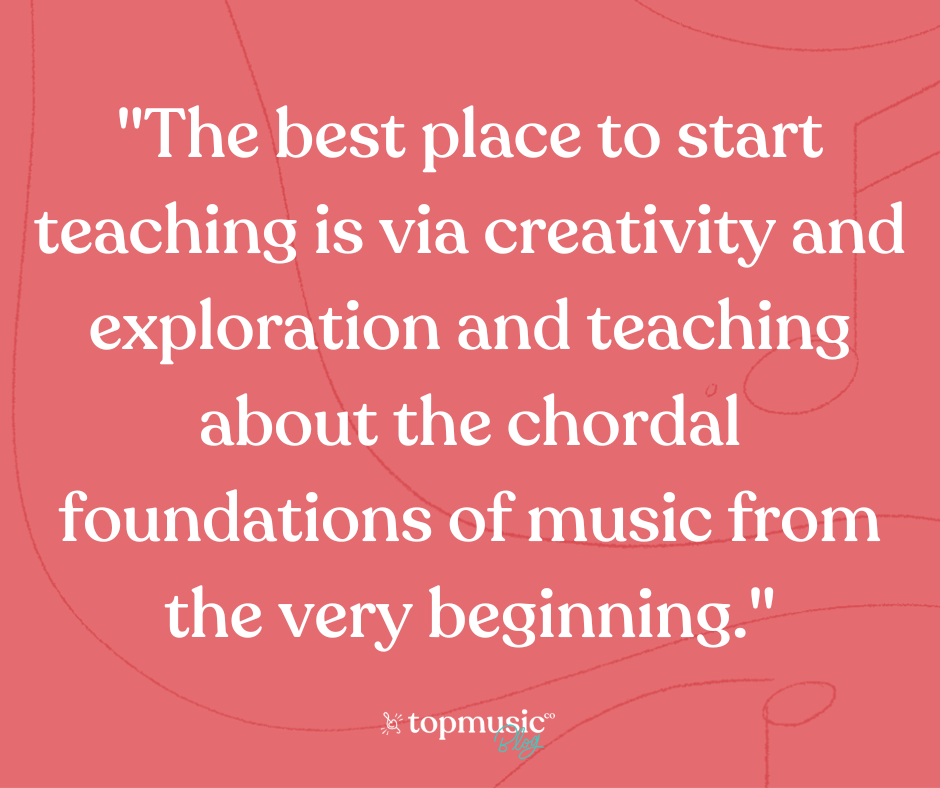
Unless you’re recommending piano students should start practicing on a cliff edge or encouraging them to play the piano with one hand in a power socket, the worst that can happen to them is that they don’t progress as fast as they could, they get into some bad habits or at very worst, they experience pain.
All of these conditions are solvable, and while I’d never advocate teaching in a way that causes pain (!), improving your skills in these areas is just a matter of further research and with time and commitment, you’ll improve and refine your approach.
Don’t let your worry about providing the “perfect” piano lessons cloud your ability to get on with the job of inspiring your piano students. As long as you’re alert to possible issues in your piano lessons, you can find the solutions you need.
One of the best sources for learning more about how to teach piano lessons is to watch master classes, either live or on YouTube. The Masterclass Media Foundation is just one of many organisations that centre around this style of learning which is perfect for piano teachers.
As music teachers, we’re lucky, in that we can watch other piano teachers in action. History teachers would find it hard to watch other history teachers in action as master classes aren’t a common part of history instruction. For me, master classes are about my own professional development just as much as my piano students.
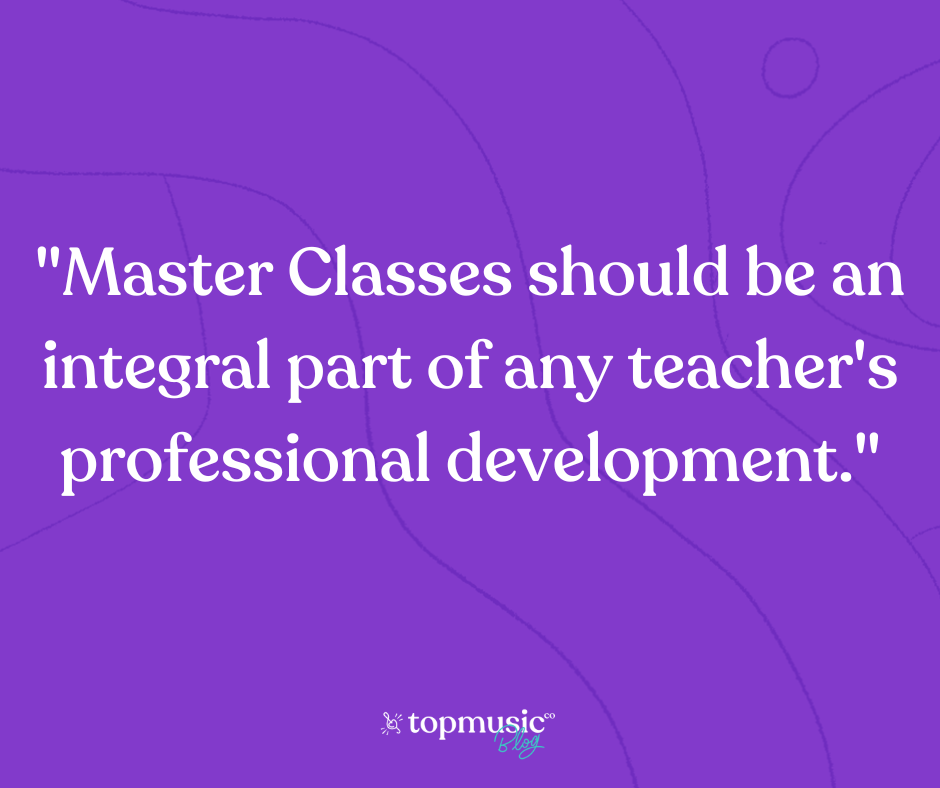
Surprisingly, chords were not a main focal point of lessons when I first started teaching piano. It was only after years of giving piano lessons that I realised the importance of chords in beginner piano lessons. I’m sure this will be a shock to those of you who have been following me for a while or have heard me speak at conferences!
When I first started teaching beginner piano lessons, like many teachers, I taught students that “Every Good Boy Deserves Fruit” (the rhyme we use to learn the notes on the treble clef here in Australia) and assumed that straight-out note reading was the best learning style.
I now know that this is far from optimal.
The best place to start teaching is via creativity and exploration and educating about the chordal foundations of music from the first few lessons.
Every piece of music, all your students’ favorite songs (excluding atonal/serial compositions) are based on a harmonic structure derived from chords. As a result of not explicitly teaching beginners about chords from the very start, you are missing the best opportunity you have to deepen their understanding of music from day 1.
I like to teach like a guitarist. If students learn how to play the I, IV and V chords in a few basic white keys they will be able to sound like pros in the first few weeks of lessons! Not only that, but they are also gaining an understanding of how music is composed and structured, all while having fun on their new instrument.
If you’re unsure about how to do this, I have created a 10-week chord teaching framework that is available in the TopMusicPro community.
You can grab the first 3 complete lesson plans below for only US$6.99.
Oh, and students love it!
Separating individual parts of a comprehensive music education never works. If you try and fit aural, theory, sight-reading, general knowledge (and more!) into a 30-minute lesson time, you’ll never get there.
Instead, you must make connections between all these areas with every piano student, in every piano lesson, consistently. How?
Not sure how to approach this kind of teaching? I discuss this method in-depth in podcast episode 9 with Paul Harris: TTTV009: Paul Harris on Simultaneous Learning
Making musical connections is one of the most fundamental aspects of becoming a skilled pianist, so it goes without saying that you should teach in this way as much as possible.
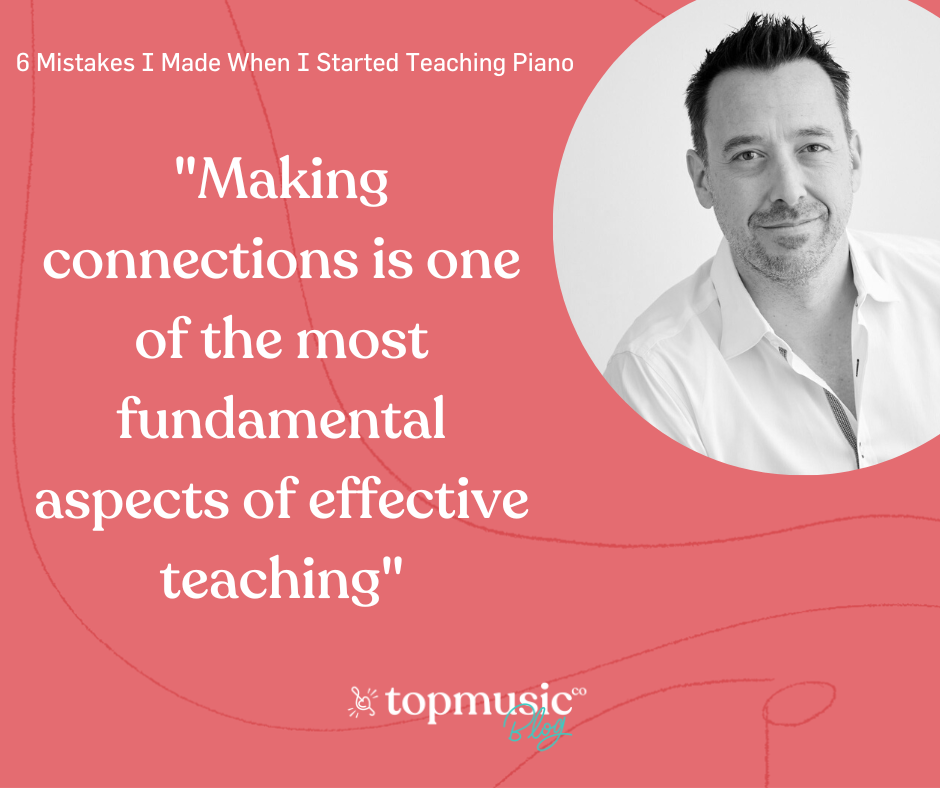
Times have moved on from when teachers were the people who knew everything and students were empty vessels that needed filling up with information. In some places this might still be the case, but many piano teachers are now realising that the internet and technology are making the role of teachers more and more redundant.
The value of a teacher is now as a guide and mentor, not as a know-all.
As a beginner teacher, I was often worried about what students would think if I didn’t know an answer. I also thought piano lessons would not run smoothly if I made mistakes in front of students. This is understandable given that I was also questioning my own abilities!
I now know, of course, that this is a mistake.
Students don’t mind if you don’t know every answer. In fact, they’ll enjoy the fact that you admit it and might need to jump online for help during a lesson.
Assuming that you know the basics of music, have confidence in your piano playing ability, and are already a competent teacher, this is totally OK!
Remember that you should be learning things just as much as your students are learning new things every day. Life would be no fun without challenging your own knowledge!
Be open to failure and being unsure, even if it’s in front of your students.
In Australia and the UK (and no doubt other areas of the world), music education can easily become fixated on examinations. Lessons can follow the structure of:
This is a method of teaching piano lessons used by many around the world.
A really bad method.
Many of the first piano students I started teaching when I was a beginner were already in the exam system, so I continued this way until I realised how anti-music it can be.
Read my post: Why working to exams is anti-piano for a deeper discussion about my views on this.
Of course, I’m not saying that music exams are bad. The mistake is to base your piano lessons around an exam syllabus and use the syllabus like a curriculum.
As ABRSM Executive Director Tim Arnold says in Podcast 17,
“…an exam is only part of your toolkit and if you were to only learn three exam pieces a year, you would only have scratched the surface of music over an 8-9 year period”.
We want our students to do much more than just scratch the surface of music, right?
I’m sure other piano teachers are like me, and want piano students to leave the studio feeling accomplished. Becoming a skilled pianist means exploring a huge variety of music, both written and composed, in heaps of styles and through a process that involves lots of creativity. You can’t achieve that through only sticking to an exam syllabus year after year.
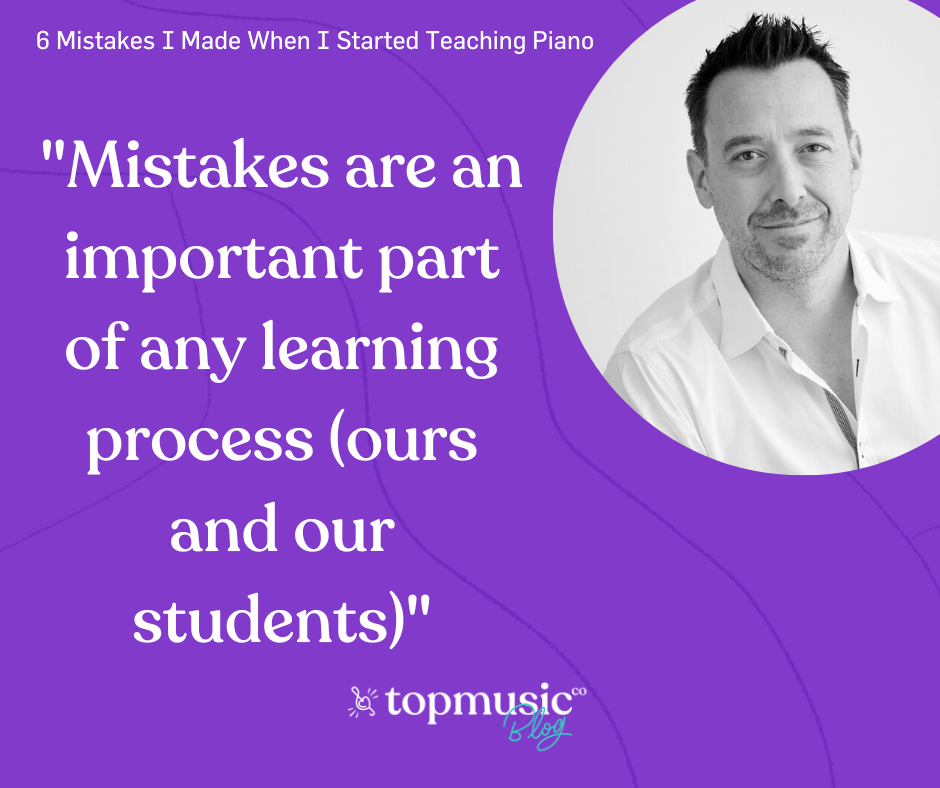
If you are making this mistake now, I urge you to stop and re-think your teaching methods for next year:
If you’ve been caught in the exam cycle trap, make next year your year to get out of it. I guarantee your students will thank you for it.
If parents are on your back, you need to educate them about the merits of a broad-based music curriculum in the piano studio. Ask them if they want their child to pass exams or learn to love music.
And if you haven’t made this mistake: well done and keep up the great work!
When I first started teaching, I didn’t give much thought to sight-reading. When it comes to playing piano, I have always been a good sight-reader so I assumed that my students would be too. It wasn’t until after quite a few lessons that I realised that this was far from true.
Whether your student is an absolute beginner or a concert-level performer, they should be sight-reading all the time. As a pianist, you know it’s one of the most important skills a musician can develop. And as a piano teacher, it’s your responsibility to guide and encourage them to understand the importance and to work on improvement.
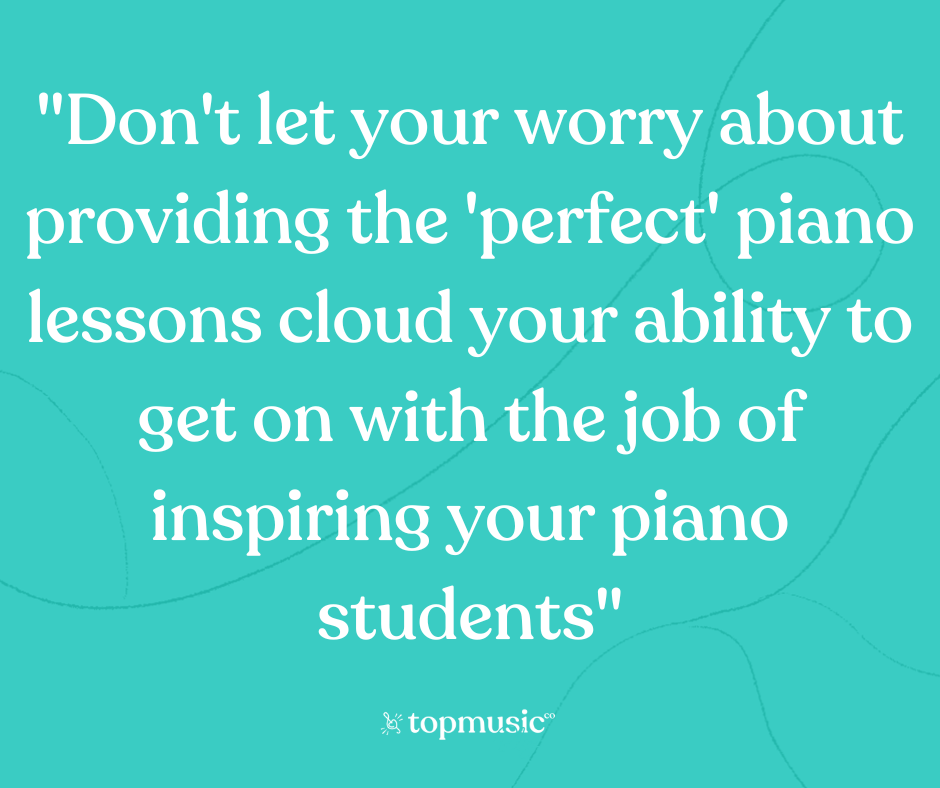
I’d say that around 90% of the students that I come into contact with (my own students, when examining, at master classes, etc.), struggle with this key skill. I now make sight reading the focus of the start of every lesson with every student.
Just allocate 3-5 minutes during their piano lesson to get your student practicing their sight-reading skills. This will help them understand how to sight-read both in private lessons and on work you set them to do over the week.
When it comes to my preferred lesson book for sight-reading, I like using the Piano Adventures sight-reading books. They’re structured in a week-by-week format, and they also introduce and practice ideas in an intervallic and chordal manner which suits how I like to teach.
I’d love for you to share your biggest mistake as a beginner piano teacher.
What would you like other young teachers to avoid?
Please leave your thoughts below.
If you’re a new teacher looking to get off to a great start to your teaching career, why not check out my new course on ensuring your studio is set up to succeed?
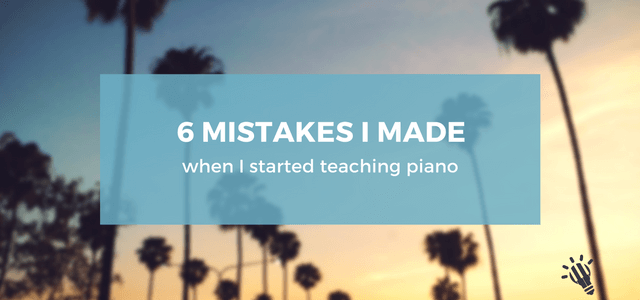
Sean B says:
I’m fairly new to piano teaching and was mostly self taught. One big mistake I’ve only recently noticed and am trying to correct is that I explain too much and demonstrate too little. I find students understand much easier if I just show them what I’m talking about. Really enjoyed reading this article.
Tim says:
Hey Sean – totally agree. We all talk to much as teachers. You’re right – often demonstrating is better anyway. I once challenged myself to a “no talk” lesson – was quite a challenge. Thanks for reading and commenting!
Pat says:
My grandson(age 8)is experiencing stress when being forced to play along with a cd in his lessons. The tempo of the tape causes him to have anxiety and when discussing with the teacher .. he told us to find someone else to teach him . Very disappointed !
Tim Topham says:
Hi Pat – I’m sorry this happened to your grandson. It’s sad the teacher didn’t realise that there are plenty of apps now that allow changing the speed of backing tracks. I hope you found a new teacher for your grandson.
David Mc Namee says:
Nj
Hi Everyone! Im currently a leaving cert student in Ireland who’s about to be entering college. Ive been learning piano for over 11 years now and am planning on teaching next year. I have a grade 8 diploma with the RIAM and I feel confident enough to ‘fake it until you make it’ but Im a bit scared about starting this new job of teaching. Any advise?
Leeanne Innes says:
We as teachers should be proud to state to our students and their parents that we are always learning. I think it shows that you care about the quality of your teaching and that you keep up to date with modern pedagogical practices.
Phill says:
Just to say, it’s nice to have many of my own opinions echoed here, it is difficult to promote a broad approach as parents and the current institutional methodology, still, is very exam focused in the way you mention. Anyway, you’ve encouraged me to explore more sources for links and backup on this way of thinking thanks.
Marina says:
Hi Tim, great article. I was reading and sow myself there, when I start teaching. Like that example about “Russian school “ when I was studying it was boring and strict. But I newer teach as was taught, though I use some techniques of course. Try to do as many as possible other pieces apart from exam one. But sometime it is difficult as parents don’t want to understand that it is good to learn some other thing. Thanks for opening in eyes for chords teaching definitely will try with new students from now on.
Jacob says:
I found this super helpful, especially the blogpost about how exams can be used as motivation, but shouldn’t be used as a curriculum to follow. I totally agree that learning loads of different music rather than just 3 pieces a year is great for the student!
jamescameron says:
Hey Its really awesome man, Good Work.
I am running my music academy in Bangalore where I have hired piano experts who teach piano to students and young generation. Your article has helped me a lot and has given great ideas to improve the teaching process. For sure I will share this article to all of my students.
Thanks a lot for such a great effort.
Tim Topham says:
That’s great James – good luck with it. I have a few members inside my membership who are based in India too!
Priyantha says:
Great article! Takes a lot of the pressure off, while stirring up creativity and giving sound pedagogical advice. Thanks for this.
Tim Topham says:
Thanks Priyantha!
André says:
Hi! After not having taught piano to others for many many years, I am going back to teaching which I really look forward to. However, much has changed over the years and I was wondering what you would recommend when starting with a totally beginner student, 10 years old. How would you setup a lesson, what material would you use?
thank and best wishes from Sweden,
André
Tim Topham says:
Hi Andre – great to hear you’re returning to teaching piano. You can find out everything about my beginner approach here: topmusic.co/beginners. Good luck!
Melody Suter says:
Thanks Tim,
That was great – and I’m pretty sure I made at least all those mistakes when I started teaching, and probably many more. Fortunately there are people like you to help.
Thanks again.
Andrew says:
The biggest mistake I made was expecting students to play all of their method book pieces perfectly. Now I try to push them through a little bit more quickly, as I want them to be good readers.
Tim Topham says:
That’s right. If you stay too long on those first reading pieces, I find students lose interest pretty quickly. I don’t really expect “perfection” for anything but the main recitals and concerts.
Piano says:
It’s a great article! We’re happy to feature it!
Regina Ziliani says:
#6!! Solid sight reading skills are everything! The majority of my students take part in the RCM Practical Piano Examinations, which, thankfully, have a sight reading component. I use the RCM Sight Reading and Ear Training books with all of my students now…exam takers and not. The student’s overall enjoyment factor of their lessons and music experience is heightened when he/she has excellent reading skills.
myorchestrab says:
Amazing experiences. I am a learner of the piano. I know how to like face it when you learn something new. First day and at that time when I seat at that and start the keyboard. My mind has and stiff.
Music School says:
Best blog i ever read about how to teach piano or learn it from some one. Thanks for providing such information. I would love to read more about these topics.
Biplab Poddar says:
Most musicians have to deal with performance anxiety sooner or later in one way or another.
There are professional musicians who struggle with it each and every single performance and others who overcome it quickly.
I must say you are a great person. I am happy that I find your blog and I enjoy every minute of reading. Great work!! Keep writing!!
Don’t get me wrong, you have to be strong and confident to be successful in just about anything you do – but with music, there’s a deeper emotional component to your failures and successes. If you fail a chemistry test, it’s because you either didn’t study enough, or just aren’t that good at chemistry (the latter of which is totally understandable). But if you fail at music, it can say something about your character. It could be because you didn’t practice enough – but, more terrifyingly, it could be because you aren’t resilient enough. Mastering chemistry requires diligence and smarts, but mastering a piano piece requires diligence and smarts, plus creativity, plus the immense capacity to both overcome emotional hurdles, and, simultaneously, to use that emotional component to bring the music alive.
Before I started taking piano, I had always imagined the Conservatory students to have it so good – I mean, for their homework, they get to play guitar, or jam on their saxophone, or sing songs! What fun! Compared to sitting in lab for four hours studying the optical properties of minerals, or discussing Lucretian theories of democracy and politics, I would play piano any day.
But after almost three years of piano at Orpheus Academy, I understand just how naive this is. Playing music for credit is not “easy” or “fun” or “magical” or “lucky.” Mostly, it’s really freaking’ hard. It requires you to pick apart your piece, play every little segment over and over, dissect it, tinker with it, cry over it, feel completely lame about it, then get over yourself and start practicing again. You have to be precise and diligent, creative and robotic. And then – after all of this – you have to re-discover the emotional beauty in the piece, and use it in your performance.
Machelle says:
Made the mistake of thinking I️ was qualified enough to teach. Raised in a small town with only a church organist to teach me. I️ thought I️ was good until I️ moved. After seeing another teachers student play I️ have realized I️ shouldn’t have taught.
Tim Topham says:
Thanks for your honesty, Machelle, although I know lots of teachers who “fall into teaching” and up-skill and learn on the job and through online training, etc. and who end up being great teachers. Are you sticking with it or have you changed career?
Karen Marshall says:
Tim,
Thanks for such an excellent authentic post. What mistakes did I make? I used one piano method (I now use LOTS of different ones), I allowed parents to push me into students taking exams when waiting a little time would have been better and finally, I worried far too much about whether I was doing a good enough job. I do now and have always tried my best. We are all learning, and must try to be more self compassionate.
Tim Topham says:
Thanks Karen – we’re all learning as we go! Glad to hear you’re teaching lots of different methods.
Becky says:
Awesome article! I’ve recently started teaching again (taught before I had children, 18 years ago) and have just started back with a couple of students over this past summer.
I have been advertising more lately, hoping to gain more students – and your article was just the encouragement I needed as I expand my “studio”.
My students now are all teens, but I have some younger students signed up for the fall. I have focused on the chordal method with my teen students, but I had planned to do a more elementary approach, using beginner books, with my upcoming younger ones. Your article has shifted my thinking on that strategy.
Looking forward to listening to the “simultaneous learning” podcast that you referenced. That is something I have tried to incorporate in my lessons, but I hope to get some help with that strategy.
I hope to be joining the inner circle very soon!!
Tim Topham says:
Hey Becky – that’s great news. Glad you found it helpful. Also check out my No Book Beginner framework for your younger ones: topmusic.co/beginners. Think you’ll enjoy it!
aishling says:
Found this article so helpful! I stopped teaching piano because I got so scared I wasn’t doing things right and got very stressed out. Especially young kids, because they lose concentration so much I began to think “ugh nothing im saying is probably making sense to them”.
BUT this made we want to restart fresh. Can someone help me though, where do I actually START? Like as soon as they sit down for the first time, what do I do first? Where do I begin? Do I have to have a schedule written out on what to do? This is what worries me! If someone could help that would be GREAT. Thanks!
Tim Topham says:
Glad to hear Aishling! Re your question, this will help: https://topmusic.co/teach-piano-beginners-lesson-plans/
We’ll also soon have a course in my membership exactly for new teachers like you called our “New Teacher Roadmap”. release date is November 2017.
You can become a member here: https://members.topmusic.co/inner-circle/join-the-community/
wang ying says:
hello tim!
the artical really help me a lot.
tomorrow it would be my first time to teacing piano。
and i just can’t stop worring.
now, i feel more relax about teaching。
sorry my english is not good.
Tim Topham says:
Thanks Wang Ying. Just enjoy it – and let me know how it goes 🙂
wang ying says:
hello tim
Maybe a little frustrated but ok ?
more like a REPEAT machine.
Because I am taking over another teacher’s job。
So i suddenly have 4 students,all about 4-6years old .(increasing,got a little overwhelming)
actually what i prepeard was not much used.
But sing the melody and typing beats with them over and over again.
+ draw their attention back every 5 minutes.
Tim Topham says:
You might like to adapt some of my “No Book Beginner” framework ideas. In fact, we’ll be releasing a version for pre-school later this year. https://topmusic.co/teach-piano-beginners-lesson-plans/
Becky says:
Thank you!! This was sooo helpful. I’m am a horrible perfectionist and question myself all the time. It’s rather exhausting! I’d much rather enjoy giving my knowledge to my students! Thank you!
cool kid says:
Hi i ama piano teacher
Ben Gessel says:
When I was starting teaching piano lessons, some several years ago, I already had a BA in Music, I already had an advanced level of piano skill, a semi-pro level of horn skill, and was one of the best composers I knew of, anywhere, just lacked experience, etc.
Of course, I wanted to teach piano very much like I was taught. I had very kind teachers, and that was a big, BIG deal to me, to always be kind and considerate to my students. My horn and composition instructors, professors, etc., had been far more demanding, pro level, etc., compared to most of my piano teachers.
I have to say, the biggest mistakes I made, during the first few years of piano instruction, etc., were:
1.) Moving some of my students a little bit too fast/giving them too many fingerings in their pieces, etc. But this worked out “ok”, as I very early in my piano teaching began to stress a great deal of music theory exercises, flashcard work, quizzes, ear training, music theory games, memorization devices, all kinds of things like that… More esp. for the students who needed more work in this area.
2.) Too much reliance on a beginner method/structure of that method, for the majority of content during a lesson (for beginners). …Begnner methods are great, and they are just fine for many students. However, most every method benefits from additional material that the student is especially interested in, whether music theory games online, movie themes, soft rock/pop tunes, or music I would write specifically for students. And then you have the European methods, exercises, etudes, etc., with the intermediate folks, as well as the classical collections, etc. All kinds of things out there. Gotta keep things “fresh”.
3.) Assigning too much music to students who couldn’t practice that much music during the week (of course, there were students who did practice upwards of 5, 6, or 7 different pieces at a later elementary/early intermediate, or intermediate level of difficulty). I didn’t take fully into account the student’s practice habits, time spent practicing, etc.
All of these things I have made huge improvements in over time. There is something to teaching private lessons, esp. in the student’s home, however, where there is always the element of the unexpected, etc. 🙂
Mari Vogel says:
Hello,
Really enjoyed the article! I have over 10 years of piano practice, starting at the age of 7. I haven’t played for the past couple of years due to various reasons (attending college, moving across country, etc…) I recently bough myself a decent keyboard so I can start playing again at home. I move way too much for me to justify getting a grand piano and honestly cost is a factor right now. My question is, how important is it for beginners to learn on a grand or upright piano as opposed to a keyboard? I bought what is closest to a real piano as I could get, but with my experience I also know the benefits of playing on a grand piano and would feel slightly funny teaching on a keyboard…My goal is to start small, teaching beginners and younger children from my home until I decide to go bigger and purchase a grand piano later. Thoughts?
Thanks,
Mari
Tim Topham says:
Others may disagree, but I feel that a properly weighted digital piano action is just fine. Just make sure it’s not a flimsy light-weighted keyboard. I always specify that if parents are getting a digital, it needs to be on a proper wooden (preferably) piano-like stand, have minimum of 1 pedal (preferably 3) and fully weighted keys.
Sarah says:
Well I recognise making most of these mistakes! Feel much more comfortable with a more holistic style of teaching now.
2 questions-
Firstly, you recommend the Piano Adventures sight reading books-can you tell me where each books fits into Graded levels? I need some new material for my ABRSM grade 1 and 2 pupils but can only buy on line so can’t browse to see which best.
Secondly, I totally agree with a non-exam focussed approach-in theory! In practise- I find that my pupils are motivated to practise fun pieces and really focus on exam work, but I find it hard to maintain motivation with challenging non exam pieces at an appropriate graded level. Do you have any ideas or advise-children seem very target and result focussed from such a young age and I would love to develop their love of music and playing for its own intrinsic rewards. Thanks Sarah
Tim Topham says:
Hi Sarah. Re the SR books, it’s not really possible to connect the grades students are at with SR in my opinion, because most students are well behind in their SR level. I’ll have students who’ve been playing for years on the PA SR Level 1 because that’s where their reading is at. You can “look inside” these books on the Hal Leonard site eg. http://www.halleonard.com/viewcloserlook.action?id=00420338&lid=-1& That’s where I’d recommend starting!
Re non-exam work, I find that students will take time to adjust but the motivation will grow as they realise how much more music they can learn when not preparing for exams. Just keep it exciting and don’t feel that every piece has to be performance perfect before moving on 🙂
Natalie Bossi says:
I have been teaching piano for many years and have had many students who have enjoyed their lessons I believe and also have passed their exams each year with excellent marks which in ,itself has given them a huge sense of achievement. I must ask you, as someone who has the A.Mus.A, how you can possibly say that sitting for exams is the wrong way to teach?? I have the A.Mus.A. too and I know just how much work it takes through sitting for many exams, particularly that one, to achieve that diploma. So you obviously yourself reached your level of ability through the exam method. So why tell everyone else it is not the right way?? I believe it is possible for students to sit for their exams, that is yes, learn the exam pieces, which, by the way are structured in a way, that the student is progressing along in the correct way and can see that progression. At the same time, I have always allowed each student to choose a piece of music that they would like to play for themselves. This has given them that freedom to love the music they are playing too. But without exams, there is no structure, no motivation in reality and the idea of you suggesting that students can randomly just play a huge number of pieces, just for the fun of it, is very unrealistic.
Students have limited time as it is for practice with all the other things they have to do. The idea of them playing some huge amount of pieces and seeing no definite progression through an exam system which is there to teach them to become excellent pianists, is very unrealistic and very wrong. I am sorry, but you really should not put people off exams. Something that you, yourself actually followed in order to achieve that diploma level. How else would you have done that?? And this as I recall, was the best experience of my life, the achievement at each exam, as I progressed and finally achieving the diploma. There was always love of music involved. That is something a good teacher knows how to instill. You dont need gimmicky things to do that if you know what you are doing as a teacher.
Tim Topham says:
HI Natalie – thanks for your comment. It’s not that I don’t think students should do exams, it’s that we shouldn’t teach to an exam system and assume that exams are the best for all students.
Too many teachers just do exams because that’s the way they were taught, without much thought about whether this is actually right for each student.
You’re right – exams can be a great motivator for some students. But when students are put on the “exam express”, completing grade after grade every year, learning 3-5 pieces each year at the edge of their technical ability and with no time for anything else like improvising, composing, playing popular music, playing by ear, etc., they are both missing out on a huge chunk of what it means to be a musician and many lose interest with the pressure.
As you say, time is short and getting more and more limited for students so it’s even more important we make sure we’re utlising that time wisely.
Sara Chatalbash says:
Hi Tim,
I realized today that I shouldn’t worry so much about appeasing everyone and doing whatever necessary to keep a student. Sometimes, it’s just not worth the hassle. I had a student today cancel last minute and refuse to accept that she had to pay for the lesson anyway since she didn’t give me 24 hours notice. She became very heated and said she wanted to cancel all lessons. At first I cared, but after taking a beat, I realized I don’t need that type of drama and inconsideration in my studio. She can easily be replaced with someone who values my time and respects the policies I’ve put in place. These valuable lessons come with time and experience and even after 8 years of teaching, I’m still learning!
Tim Topham says:
Good job, Sara – I think that’s the right decision. I had parents whinge and get very heated in the past about missed lessons too. Because I have a good relationship with them, they feel that it’s like “mates rates” and it’s OK to do whatever they want. Well done for standing up to them!
Jo snowden says:
Hi Tim,
Inspired by this post, one of my main goals for 2016 is to introduce a LOT more chord-based work. I started today, and using your publications I hope to have a plan/curriculum ready for beginner/late beginner students when I start back in January.
One of my biggest mistakes (I started teaching in July) was not to focus on technique right from the very first lesson. I followed advice in a method book not to dwell on it or push it, and now I’m spending far too much time trying to correct a lot of key-jabbing and sticking-up pinkies!
Tim Topham says:
Hi Jo. Thanks for sharing your own mistakes. I know what you mean about technique – you want to keep students motivated and keen and therefore don’t want to bog them down in technique, but you also want to lay the right foundations. It’s a fine line and I don’t always get it right either! Good luck with the chord work – would love to see the curriculum you come up with that suits your studio and your students 🙂
Greg Markham says:
Hi Tim,
I remember my early days piano teaching. I learned a lot – more about being well prepared for each lesson and learned a lot from my mistakes. Kept a diary of all my mistakes and how to remedy them. Kept a diary on students progress and where I expected them to be within a specified period.. it was a most enjoyable time.
Tim Topham says:
Sounds great Greg – the mistakes diary would have been fascinating to look back on.
Roni Rothwell says:
Hi Tim.
In the early days of my teaching, I was using quite a few methods that had the pupil fixated in middle C position, so they were then scared to move around. There are some really good American methods I now use, mixing up the positions every few weeks, and also using the pieces for quick sightreading, using thumbs on either D or B. Keeps the pupils on their toes, and more likely to see the steps and pitch relationships between notes, rather than worrying about note names.
Tim Topham says:
Hi Roni. Getting out of “middle C position” is so important – Well done on using a different approach now 🙂
Anita E Kohli says:
Hello Tim,
I think I made all of these mistakes and more. Communication was one of my weakest points. Many years ago, I had a batch of parents, who did not understand how to support their children, and were actually doing things that got in the way of their child’s progress. I was not able to get through to them. That’s when I did a course on personal counselling which was specifically for people in professions that help people (to teach them how to interact), and started reading a lot, and 6 months later, had very very supportive parents. I’ve made mistakes along the way after that, and I’m sure I will make new ones in the future, but overall, my work flows much smoother, because I know it’s my weak spot and am constantly working on it.
The teaching for an exam only though – it’s different with Mumbai students and parents. Both are very very keen on exams, and I’ve had parents who made sure practise was done for exams, and then post-exam, scheduled so many activities, that children could not practise. Some of them are from families that don’t listen to music at all.
I’ve realised, that students and parents, sometimes start out with only an exam as a goal, and then later develop a real interest in piano playing.
And yet, my teaching goal is not the exam. So, I’m slowly learning, with these kids, and parents, to introduce non-exam work, but clearly explain how it will help the student in coping with exam work, because that it what works with them.
Tim Topham says:
Thanks Anita – great points 🙂
Tim Topham says:
Hey Anita. I didn’t know that there were music exams in India – what are they called. Great to hear the work you’ve done on communication – talk about dedication to improving your practice. Perhaps we’ll need to get you to share some ideas about “how to coach parents about practice and exams”!!
Anita E Kohli says:
Hi Tim,
We have Trinity, ABRSM and LCM (more recent) conducting exams in India. Trinity has the widest student base here, with many centres in Mumbai, as well as all over India.
Honestly, there’s no difference my teaching approach for students doing exams or those who don’t. I’ve been trying to change the way I teach the past few years, to approach music learning in a holistic way – so students can see the relevance of theory & scales to their playing. I’m just working on doing the same with ear training (planning my work over this Christmas holiday) and hopefully will have figured it out in the next year.
Most Mumbai students and parents want exams, because it helps students later, when they apply to get into college, or want to study abroad.
So, exam work, is usually not a problem, except for a small percentage of parents, who underestimate the level of commitment required to do well. This is one of the many reasons I’ve started talking to parents in the last part of class, and explaining things in more detail.
I am interested in writing on the need for parent education during piano class, as I’ve been doing a lot more of this in the past year, for a variety of reasons, and it’s paying off. Will mail you.
Milla says:
I consider my mistake using “Music for Little Mozarts”. It has good “Discovery Books” and CDs with good activities; flash card are also very helpful. But it is solely based on 5finger positions, and when I was offering students supplemental pieces from other methods, they were completely thrown off. Even for those who are already using different method books, I sometimes get panicky calls from parents: ” What is position for this song? We can’t figure it out!”
Tim Topham says:
Yes this is a HUGE mistake of some methods, so thanks for bringing it up. A method that has regularly changing hand positions, right from the beginning, is VITAL 🙂 What do you use now?
Milla says:
Faber, Tales of Musical Journey.
Gary D says:
This is brilliant and I could not agree more with this. I have made all of these mistakes too and I’m glad to say I’m now experienced enough to deal with them. It’s also very hard not to get sucked in to teaching people to pass exams and not how to be a musician so I think it’s great that you’re promoting this. I work on this with all of my pupils and educating their parents can be hard. Brilliant article.
Tim Topham says:
Thanks Gary – much appreciated.